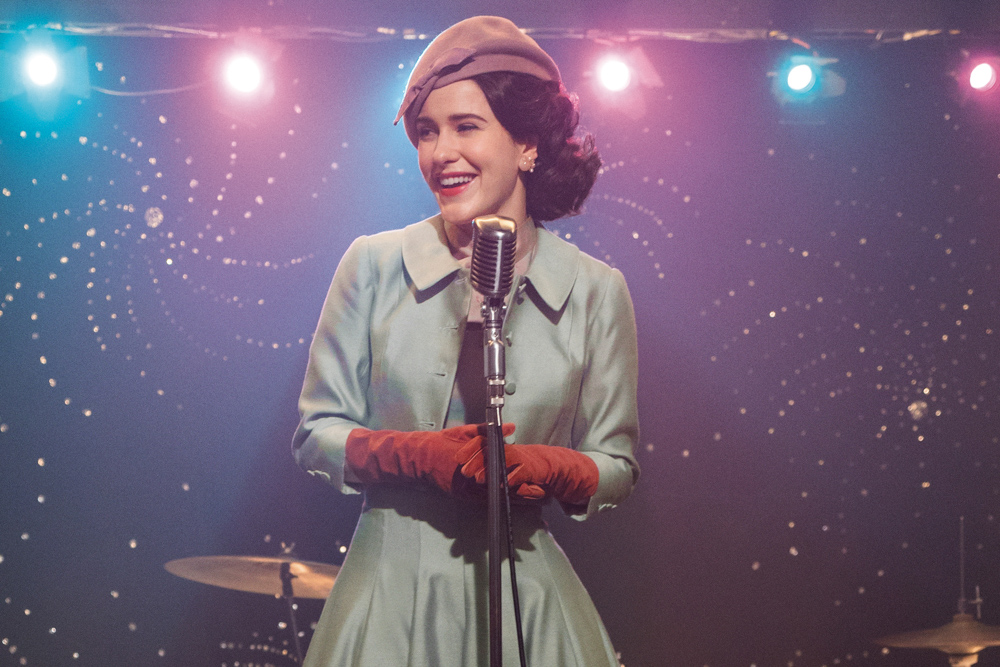‘The Marvelous Mrs. Maisel’ Steals the Show
Colorful Portrayal of Era, with Eye-Catching Fashion and Punchy, Engaging Dialogue

The 1950s and 1960s are decades marked by a progressive surge toward racial and gender equality. It’s an era of tension between clashing cultures — certainly a fruitful atmosphere for storytelling. Recent and current examples of shows offering a vivid portrayal of this period are AMC’s Mad Men (now off the air) and Amazon Prime’s The Marvelous Mrs. Maisel, which premiered its second season in December 2018 (a third season has already been confirmed). While Mad Men’s point of view focused on toxic masculinity, uneasy as the permafrost of the white patriarchy began to soften, Mrs. Maisel’s view of the changing times is optimistic. This comedy follows up-and-coming stand-up comedienne Miriam “Midge” Maisel (Emmy and Golden Globe–winning Rachel Brosnahan) as she stumbles (literally) into a career onstage after the dramatic dissolution of her marriage to husband Joel (Michael Zegen).
Midge, whose identity until her separation had been wrapped up in being a fashionable wife and mother, and an upstanding member of her Jewish community, loses her footing when Joel leaves her for his secretary. Midge discovers the freeing power of alcohol — followed directly by the freeing power of ranting onstage at the local open-mic club, the Gaslight Café. Her natural stage presence and her fresh point of view (there weren’t many female comics at that time) gets her noticed by aspiring talent manager Susie (Alex Borstein). Once sober (and released on bail — she was arrested for partially stripping onstage), Midge begins developing her act under Susie’s watchful eye. The two work well as mutual foils: Midge is an Upper West Side New York City housewife with young children and an extensive collection of shoes and hats, while Susie is cantankerous, crass, and unapologetically deviant from traditional female trappings. Susie’s knowledge of the underworld nightclub culture is invaluable to their journey, but it’s clear that Midge’s talent and cultured persona are their ticket to stardom.
Regardless of whether or not you enjoy Midge’s dry, animated, stream-of-consciousness style of comedy, the bulk of the show’s humor comes from culture clash as Midge tries to prevent her daytime image from being tarnished by her underworld persona, “Mrs. Maisel”: a young, divorced mother with some serious questions about the status quo. Beyond the strain this double life puts on her relationship with her ex-husband (who also harbored misguided dreams of life as a comic), it also throws her suspicious parents into an anxiety spiral. Her father (Tony Shalhoub) is an agitated math professor, and her mother (Marin Hinkle) is a middle-aged woman repressed by the high standards of her domestic life. Both try to be supportive of their daughter, but they are scandalized by her divorce, terrified of her new friends, and ashamed of her choice to join the workforce. In the comedy circle, Midge encounters eccentric performers such as Sophie Lennon (Jane Lynch), a vindictive comic star whose act is a vaudevillian farce, and infamous comic Lenny Bruce (Luke Kirby). The characters are comically intense and constantly interesting, and they provide relief from Midge’s sometimes-overwhelming personality.
The Marvelous Mrs. Maisel gives a colorful portrayal of the era, with eye-catching fashion and punchy, engaging dialogue. Midge’s new life outlook is sunny, giving the series a conversational, inviting tone — though there’s no avoidance of the gender expectations that hinder Midge and Susie’s rise to fame. Despite an undeniable undercurrent of emergent feminism, Mrs. Maisel skirts flagrant preachiness. The stakes get higher in the second season as Midge’s career grows, her life evolves, and she discovers an unquenchable ambition that elicits guilt sure to haunt her as the series goes on. As Midge’s career grows and her life evolves, the narrative arc of the series is more about following a passion despite the risk of losing relationships and failing social expectations than it is about feminism — though the two concepts bear resemblance. The Marvelous Mrs. Maisel is fun and bingeable and offers delightfully neurotic roles for a talented cast.



